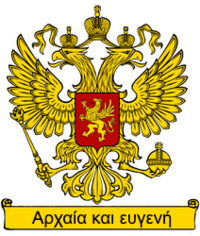Treaty between Constancia and the United Principalities
The Treaty of friendship and cooperation between the Imperial State of Constancia and the United Principalities of Cibola is a binding treaty.
Text
TREATY OF FRIENDSHIP AND COOPERATIONBETWEEN
THE IMPERIAL STATE OF CONSTANCIA
AND
THE UNITED PRINCIPALITIES OF CIBOLAArticle I – Peace and friendship
There shall be a firm and perpetual state of peace and friendly relations between the Imperial State of Constancia and the United Principalities of Cibola, and between their territories, authorities, and citizens, without discrimination.Article II - Sovereignty and territorial integrity
Each High Contracting Party shall respect the independence, sovereignty and territorial integrity of the other party. The High Contracting Parties shall continue to develop and consolidate the relations of sincere friendship, good neighbourliness and comprehensive cooperation existing between them on the basis of the aforesaid principles as well as those of equality and mutual benefit.Territorial integrity includes the territory of a High Contracting Party to the extent acknowledged and published by the Micras Cartography Society and, as applicable, the Convention of the Law of the Seas.
Article III - Airspace
Each High Contracting Party commits that any overflight of its airspace by civilian or commercial aircraft registered upon the territory of the other High Contracting Party, whose source and destination are outside the jurisdiction of the Overflown High Contracting Party and which make no intermediate landing upon the territory of the Overflown High Contracting Party, shall be considered to fall outside the remit of customs or immigration regulations and wholly outside the jurisdiction of any Third Parties, without prejudice to the exclusive right of the Overflown High Contracting Party to approve or deny such overflight as it sees fit. The High Contracting Parties will cooperate on connecting their countries with airline routes.The High Contracting Party can set up a Prohibited airspace, an overflight is strictly prohibited. The High Contracting Party informs about Prohibited airspace and appropriate punitive measures follow an overflight of an aircraft registered with the other High Contracting Party.
Article IV - Trade
The High Contracting Parties endeavour to keep tariffs and customs fees for trade between them as low as possible under the circumstances they face. The Parties shall be in regular contact on matters of trade and trade routes.Article V – Diplomatic mission
The High Contracting Parties will maintain regular contacts with each other on major international problems affecting the interests of both of their countries and governments by means of meetings, and exchanges of views between their leading statesmen, visits by official delegations and special envoys of the governments, and through diplomatic channels.The High Contracting Party will make an embassy, and when requested, consulates available for each other.
For the embassy, associated grounds, associated vehicles, leading statesmen, visits by official delegations, special envoys of the governments and ambassadors, diplomatic immunity applies.
Each High Contracting party recognizes and respects the procedures of acceptance by the ambassador, by handing over a letter of credence, which is addressed from one head of state to the other asking to give credence.
Article VI - Recognition of bureaucracy
Each High Contracting Party gives to the other full faith and credit to all public acts, records, contracts and judicial proceedings in the field of civil law, including records and documents on marriage, property, titles, death and inheritance, in as much as any act, record, document, contract, proceeding is done according to the law.Article VII - Interpretation
Any difference of interpretation of any Article or Articles of this Treaty which may arise between the High Contracting Parties will be settled bilaterally by peaceful means in a spirit of mutual respect and understanding.Article VIII - Ratification
This Treaty enters into force upon the exchange of ratification by Both High Contracting Parties in accordance with their respective domestic procedures.Article IX - Force
Should a High Contracting Party withdraw from this Treaty this must, as a courtesy, be communicated to the government of the Other Contracting Party.Done at (place), (date).
For the Imperial State of Constancia:
Hamid RasimeFor the government of the United Principalities of Cibola:
- Hans-Georg Nimitz
- Chancellor of the United Principalities of Cibola

